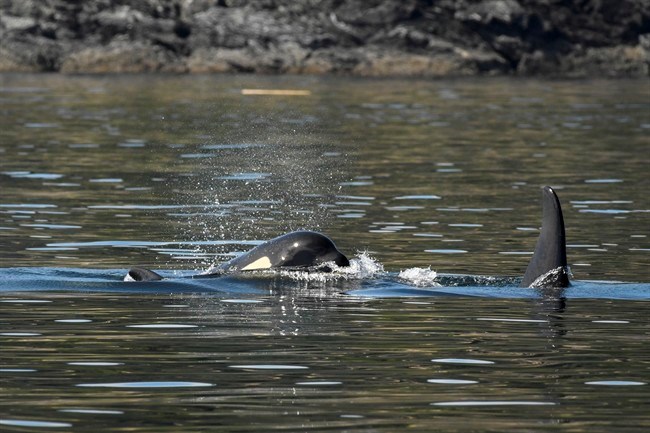 American and Canadian scientists are considering a Hail Mary effort to save an endangered four-year-old killer whale, known as J50, which appears emaciated, lethargic and has lost about 20 per cent of its body weight. J50, left, is seen in U.S. waters off Washington state in a July 21, 2018, handout photo. An endangered killer whale that has prompted an international rescue effort won’t receive antibiotics by dart or by fish if it’s found in Canadian water today. THE CANADIAN PRESS/HO-NOAA, NOMADS-EXPEDITIONS.COM, Katy Laveck Foster
American and Canadian scientists are considering a Hail Mary effort to save an endangered four-year-old killer whale, known as J50, which appears emaciated, lethargic and has lost about 20 per cent of its body weight. J50, left, is seen in U.S. waters off Washington state in a July 21, 2018, handout photo. An endangered killer whale that has prompted an international rescue effort won’t receive antibiotics by dart or by fish if it’s found in Canadian water today. THE CANADIAN PRESS/HO-NOAA, NOMADS-EXPEDITIONS.COM, Katy Laveck Foster
An emaciated and endangered killer whale that scientists feared could be dead has been spotted swimming in the waters off Vancouver Island.
Paul Cottrell of Fisheries and Oceans Canada says a federal research team saw J50 Tuesday afternoon near Port Renfrew, B.C., but conditions were so foggy that they couldn't assess her condition.
The young female orca has sparked an international rescue effort by Canadian and American scientists who have developed a novel plan to feed her salmon medicated with antibiotics.
J50 is one of only 75 Southern resident killer whales that swim the coastal waters between British Columbia to California.
As a female with reproductive potential, scientists say she could play a vital role in her species' recovery if she survives.
While the salmon-feeding idea has not yet received approval from Canadian officials, Cottrell says Canada is prepared to give the green light to a plan to administer antibiotics by dart or with a pole-mounted syringe, once it receives an application from its American counterparts.
The first step before administering any antibiotics will be to assess J50's condition, once she is located again in appropriate conditions.
"In terms of the licensing for the pole-mounted antibiotic injection or the darting mechanism ... the activity from scientists has been approved, but we still need the application from the individuals, the researchers, the experts who want to undertake this," Cottrell said.
Sheila Thornton, a research scientist with Fisheries and Oceans Canada, says J50 was spotted with her mother but she could not say what direction they are travelling.
Thornton says weather conditions looked better Thursday, so they were hoping for another sighting in order to collect fecal and breath samples from J50.


